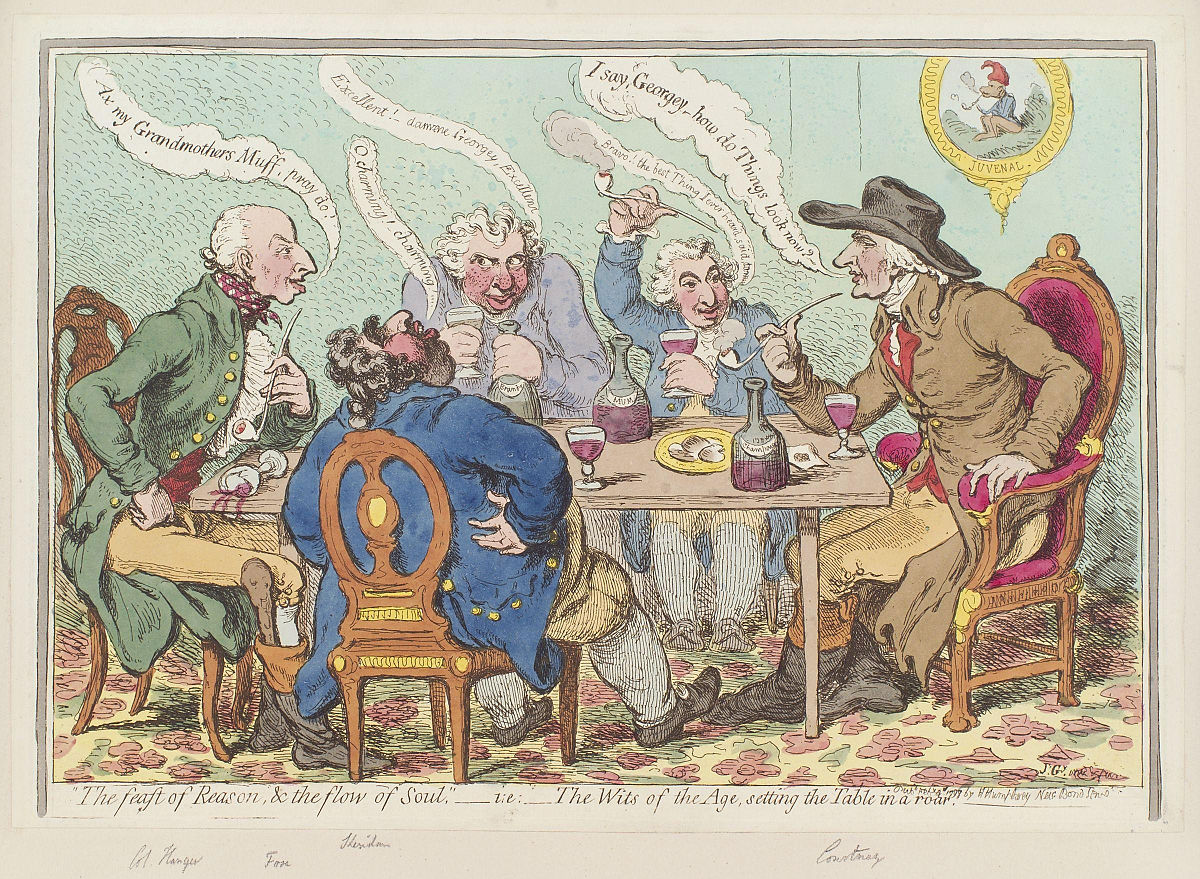What links these seven words: vulnerable, entitlement, diversity, transgender, fetus, evidence-based and science-based. Continue reading
Author Archives: Louise
In the news: is British irony stopping the Brits from being understood by non-native English-speakers?

‘The feast of Reason, & the flow of Soul’ – i.e. – The Wits of the Age, setting the Table in a roar, by James Gillray / Wikimedia Commons
“The British are proud of the idiomatic humour of their language. But an academic has argued that they are actually falling behind because they insist on using phrases that the rest of the world does not understand.” The Telegraph has the full story.
“Not only did the British keep to themselves but they also said that they [a group of Hungarian, German and Italian students] get along very well, they understand each other, and the only trouble comes when a really British person comes and joins the conversation.”
Sorry! — Ed.
***
10 millennial words & phrases you might want to know
Does your 20-something daughter sometimes use words or phrases that you sort of get — because she’s gesticulating with her thumbs and pulling a face that kinds of give you clues about what she might mean — but you’re not completely down with the lingo? Well you don’t need to wonder any more, because Glosso brings you a mini-glossary of 10 millennial slang words you should probably know — especially if she’s calling someone fleek or swoll, or if the new bae is coming to dinner … Continue reading
In the news: The clown & Comic Sans
Trump’s Lawyer Issues Press Release In Comic Sans, and Learns The Hard Way That No One Should Use That Font. Bored Panda has the whole comic story, sans irony.
***
Names of online scams
Here’s the ultimate 21st-century glossary — of online scams. Go phish … (And note: All definitions are courtesy of the Oxford English Dictionary, except where noted. These names are legit, even though the practices aren’t.) Continue reading
“Complicit”
Dictionary.com has named complicit its 2017 word of the year. CNN has the full story. Continue reading
A Spellbound Palace
A Spellbound Palace
On this kindly yellow day of mild low-travelling winter sun
The stirless depths of the yews
Are vague with misty blues:
Across the spacious pathways stretching spires of shadow run,
And the wind-gnawed walls of ancient brick are fired vermilion.
Two or three early sanguine finches tune
Some tentative strains, to be enlarged by May or June:
From a thrush or blackbird
Comes now and then a word,
While an enfeebled fountain somewhere within is heard.
Our footsteps wait awhile,
Then draw beneath the pile,
When an inner court outspreads
As ’twere History’s own asile,
Where the now-visioned fountain its attenuate crystal sheds
In passive lapse that seems to ignore the yon world’s clamorous clutch,
And lays an insistent numbness on the place, like a cold hand’s touch.
And there swaggers the Shade of a straddling King, plumed, sworded, with sensual face,
And lo, too, that of his Minister, at a bold self-centred pace:
Sheer in the sun they pass; and thereupon all is still,
Save the mindless fountain tinkling on with thin enfeebled will.
— by Thomas Hardy (Hampton Court)
“A-CHOO!” — “Bless you.” Sneezing and responding in different languages …
A-TISH-oo! Yes, when we sneeze, we sneeze in our own language, as you can see in James Chapman’s illustration above. It’s funny how some cultures end their sneezes with an “oo” sound and some with an “ee” (and a few even have consonants; like the Portuguese “atCHIM,” the French offer “atCHOUM”; the Filipinos add a little music, with their “hatSING”).
And then, in most countries (but not all), we respond to those who have just sneezed with words and phrases that offer simple blessings and wishes for good health or a long life. But not always … Continue reading
The name(s) of Meghan Markle, Harry’s “pearl”
Prince Harry is engaged! His bride-to-be is Meghan Markle. Here’s what you need to know about her name(s). Continue reading
Some fun forgotten words …
Do you know where to find your daddles, your sauce-box, your tallywags or your gas-pipes? Do you know what it means to feel shivviness or cosmognosis? [I have certainly felt the latter– Ed.] Are you oaf-rocked, or do you suffer from proditomania? Are you a gal-sneaker or a church-bell? Check out these (and many other) wonderful old long-forgotten words and expressions that have fallen into obscurity, brought to us by History Hustle (“25 Best Victorian Slang Terms”) and the BBC (“26 Words We Don’t Want to Lose”). Some of them have been mined from texts like Vocabulary of East Anglia (1830), A Dialogue of Proverbs in the English Tongue (1546), the New Sydenham Society’s Lexicon of Medicine and the Allied Sciences (1882), and Maine Lingo (1950), among others; you can find many more in Paul Anthony Jones’s new book, The Cabinet of Linguistic Curiosities. Or you can just do a Google image search on the terms “Victorian” and “slang”: do it when you’ve got the morbs, and you might get a gigglemug in the process. Now will you please go and bitch the pot?
***








